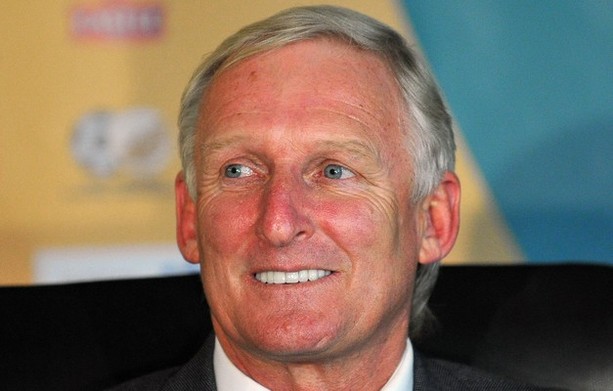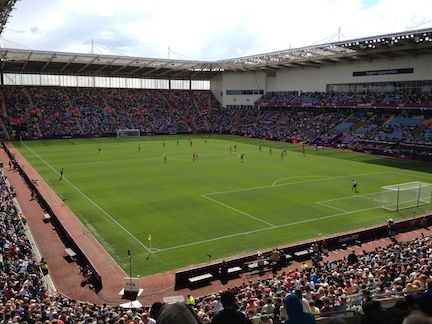
Guest Post by Chris Bolsmann (c.h.bolsmann [at] aston [dot] ac [dot] uk)
After the disappointment of Banyana Banyana’s loss to Sweden (read my post here), I looked forward to the Opening Ceremony of the London Olympic Games and the parade of athletes in particular. The three hour spectacle turned out to be full of contradictions. Danny Boyle provided a fascinating, although selective, history of Britain. He paid homage to the Suffragettes, the National Health Service and immigrants from the West Indies among others, although no reference was made to either slavery or colonialism. I particularly enjoyed his musical selection which included The Jam, Sex Pistols, and The Specials. Watching excited athletes entering the Olympic Stadium can be fun and I was heartened to see Caster Semenya carrying the South African flag.
The lack of visible corporate sponsorship in the stadium and at all Olympic venues is really pleasing to a sports fan’s eye. What a stark contrast to the 2010 World Cup in South Africa where FIFA’s corporate sponsors were visible everywhere. I have yet to come across the Olympics “brand police,” unlike in South Africa where fans wearing Orlando Pirates and Kaizer Chiefs replica shirts emblazoned with the Vodacom sponsor were told to cover them up because MTN — a rival telecom firm — was a national FIFA corporate partner.
Despite the International Olympic Committee’s apparent subtlety, one just has to turn over any Olympic Ticket and the IOC’s “Worldwide Olympic Partners” are clearly visible. The usual suspects appear: unhealthy soft drinks, measly hamburgers and the like, but also a multinational chemical company. Athletes seem unhappy with the restrictions placed on them under the IOC’s Rule 40 protecting official sponsors from “ambush marketing.” Given that athletes can even be disqualified for promoting their individual sponsors, South African swimmer Cameron van der Burgh, Africa’s first gold medal winner, must be cautious since he endorses a range of corporate sponsors on his twitter account which are not “Worldwide Olympic Partners.”
So despite the veneer of a corporate-free Olympic Games, the sponsors and their logos are everywhere. Fizzy soft drinks are even sold as “healthy food” alternatives inside Coventry City’s Ricoh Arena, which has been temporarily renamed the “City of Coventry Stadium” for the Games because the Japanese electronic giant is not an official partner of the IOC. Even the toilets are not safe from the IOC’s attempt at cleansing all traces of rival sponsors. The toilet cisterns and hand dryers have their manufacturer’s names covered up!
I got to watch a double header in this sanitised stadium yesterday as Mexico beat Gabon and South Korea defeated Switzerland. At £20 for a ticket, this represented genuine value for money. Match tickets are cheaper than what Coventry City FC charge in the 3rd tier of English football. The 32,000 seater arena was almost full with 28,000 spectators filling the stands. The empty seats, unfortunately, were the best seats available, those on the half way line behind both substitutes’ benches. According to the IOC, these were seats reserved for their “Worldwide Olympic Partners.” A shame. Besides the fans of the teams on the pitch, there were many families with young children, helped by cheaper youth ticket prices and the Sunday afternoon kickoff time.
As much as I wanted Gabon to silence the Mexican fans’ homophobic chants during opposing goalkeepers’ goal kicks, El Tri were undeniably stronger than their West African counterparts. In an evenly contested first half, Mexico had a couple of good opportunities, but Didier Ovono in the Gabonese goal was equal to the task. The introduction of Giovani dos Santos in the second half gave the Mexicans more creative options up front and he latched onto a long ball in the 62nd minute to put Mexico in front. Giovani sealed the game in the 90th minute after Gabon conceded a late penalty.
Football at the Olympics is different from the World Cup. The kits are different as the German manufacturer is not permitted to advertise their stripes. Football federation logos are replaced by national Olympic associations And for the men, 15 of the 18 members of the team are under 23 years of age. But one just has to look to the corner flags where FIFA has printed its logo and up to the official flags where the IOC’s flag hangs next to that of FIFA. In the end, the corporate interests of the IOC and FIFA merge.
Category: Hosting
Gordon Igesund named Bafana Bafana coach
It’s official: Gordon Igesund is the new Bafana Bafana coach. The well-travelled Durbanite was the outright favourite for the job, and his appointment is the climax of what has been a remarkable coaching career.
Igesund’s first coaching job was in 1985 as a player-coach for Witbank Aces. For the next 11 years, he mainly coached modest teams battling to avoid relegation, sometimes unsuccessfully. In 1992 he won the NSL Second Division title with D’Alberton Callies, but his rise to prominence began in 1996-97 when he guided Durban’s Manning Rangers to the inaugural PSL title. More league honors followed at Orlando Pirates (2001-02), Santos (2001-02), and Sundowns (2006-07), which made Igesund the only coach to annex the championship with four different PSL clubs.
His appointment as the national team coach on a two-year contract comes on the back of an impressive stint at the helm of Moroka Swallows. The fabled Soweto team sent Igesund an SOS eighteen months ago when they found themselves at the bottom of the table nearly halfway through the season. Igesund masterminded The Dube Birds’ great escape, and this season they had an astonishing year, finishing an agonising second to Orlando Pirates.
It is Igesund’s heroics at Moroka Swallows that SAFA expect him to emulate with beleaguered Bafana Bafana, currently ranked 68th in FIFA’s world rankings. South Africa’s qualification bid for the 2014 World Cup in Brazil is in serious jeopardy after draws against Ethiopia and Botswana. While South Africa’s hosting of the next edition of the African Nations Cup guarantees Bafana Bafana’s participation, there is well-founded anxiety in the country over the threat of an uninspiring showing in the tournament.
“The bigger picture is the 2013 AFCON and qualifying us for Brazil 2014,”declared SAFA President, Kirsten Nematandani, at Igesund’s unveiling. It’s the same brief former Bafana coach Pitso Mosimane was given two years ago. As SAFA made abundantly clear to Igesund, should the national team fail to reach the semi-finals of the African Nations Cup next year, then he will join Mosimane on the growing list of former Bafana coaches, which now stands at eighteen.
Igesund’s pedigree gives many South Africans hope that, despite recent results, he is indeed the manager who can lead Bafana to the continental crown and to the World Cup in Brazil. He is a wily old fox who has paid his dues in the trenches. He knows how to nurture self-belief and instil a desire to win into any team under his tutelage, regardless of available talent and financial resources. We wish him good luck in his new position.
There is a problem, however, that Igesund cannot solve even if he ends up meeting his new employers’ lofty objectives. That is, SAFA’s understanding of the “bigger picture” in domestic football is confined to four-year cycles for the men’s senior national team (or in this case a two-year cycle). But local football needs sound management, serious youth development for boys and girls, better coaches’ training, and infrastructural improvements at the grassroots. In other words, the goals SAFA has set for Igesund are no more than an attempt at a quick-fix solution.
SAFA would have done better to concede their administrative shortcomings, apologize for the dismal state of football in the country, and state that Igesund is the best bet for turning hapless Bafana Bafana into a winning team. Instead, SAFA hired the country’s most decorated coach and required him to take one of the least feared teams in Africa to the semi-finals of the continent’s premier tournament and then to the World Cup. While there is no question of Igesund’s success as a club coach, it would not be surprising if, after the 2013 African Nations Cup, he were to become the 19th Bafana coach in 20 years.
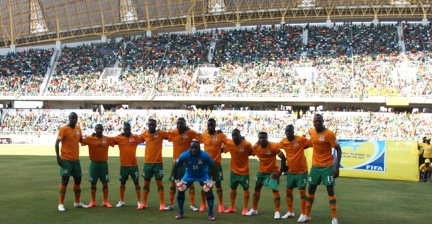
Guest Post by *Hikabwa Chipande
NDOLA — Zambia’s victory in the 2012 African Nations Cup has spawned a new fashion on the Copperbelt — the country’s industrial and football heartland — where people now wear Chipolopolo (Copper-bullets) replica jerseys as well as chitenge (women’s waist wraps) in the national colors. Selling Chipolopolo regalia has also become big business in street markets and makeshift stores. Clearly, the African champions have re-energized the mood of the nation and revitalized support for football among ordinary citizens, politicians, and business people.
The stability of copper prices, increases in copper production, an improving economy, and the pride of being African football champions, have led ZCCM Investments Holdings, formerly Zambian Consolidated Copper Mines, to reconsider supporting the sport. For instance, private companies such as Mopani Copper Mines and Copperbelt Energy have resumed their funding of Kitwe’s famous Nkana Red Devils and Power Dynamos.
“Winning the African Cup changed things,” says Red Devils head coach Linos Makwaza. “People have started coming back to football. At Nkana [Football Club] Mopani [Copper Mines] is now involved and has taken over which is good,” Makwaza says. The relationship between mining companies and football is not a new one. It has shaped the history of the game in Zambia. As far back as the 1920s, when copper mining started on the Copperbelt under British colonial rule, and into the independence era up to the privatization of the ZCCM mining company in 1991, government-controlled mining companies provided football grounds, financial resources, coaches, players, and stimulated a deeply rooted fan culture.
Zambia’s Nations Cup success has inspired politicians such as Sports Minister Chishimba Kambwili to encourage new owners of copper mining companies to sponsor Mighty Mufulira Wanderers, Nchanga Rangers, Nkonkola Blades, Roan United, Kalulushi Modern Stars and other important, but struggling, clubs in the mining province. Abraham Nkole, currently Mighty Mufulira Wanderers manager and a former player in the 1960s and 1970s, sees this shift as an opportunity to resuscitate the “lost glories” of Copperbelt football.
The opening of a modern stadium in the mining town of Ndola has also injected new life in Copperbelt football. I was in attendance on June 9, 2012, for the inauguration of the Chinese-built 40,000 capacity Levy Mwanawasa Stadium, which hosted a Zambia vs. Ghana 2014 World Cup group D qualifying match (see photo). Thousands of fans clad in green and orange Chipolopolo replica jerseys besieged Ndola. With Vice President Dr. Guy Scott in the stands, Chipolopolo beat the Black Stars 1-0 in the packed stadium, thus renewing their hopes for qualifying to Brazil 2014 after being thumped by Sudan 2-0 in Khartoum a week earlier.
Practitioners and fans I spoke to on the Copperbelt are encouraged by recent developments and hope the mining province will soon reclaim its dominant position in Zambian football after two decades of decline. The political and financial investment that is fueling the game’s resuscitation owes much to Chipolopolo’s international success. The question is whether such support will continue should the national team perform badly at next year’s African Nations Cup in South Africa.
*Hikabwa Chipande is a PhD candidate in African history at Michigan State University. His dissertation research is on the social and cultural history of football in 20th-century Zambia. He can be contacted at chipande [at] msu [dot] edu.
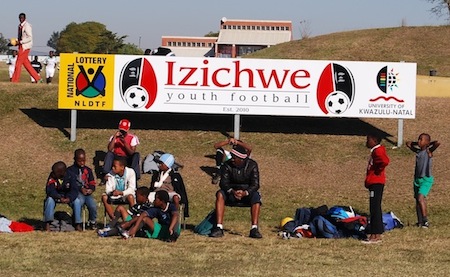
In the wake of Pitso Mosimane’s firing as Bafana Bafana head coach, there seems to be general agreement in South African football circles that a plan is needed to develop the local game constructively and sustainably.
On this blog, Mohlomi Maubane recently argued in favor of a German model that synchronizes the interests of the FA, the national team, and of professional clubs. “It is by virtue of young players being trained well that the German national team, and any other national team, can realise its full potential,” added Ted Dumitru and Sipho “King K” Kekana over at maximalfootball.com. “Lack of technical education in this vital aspect made many nations, including SA, compete without an identity and the results have been disastrous,” the two experts point out.
On June 9-10, 2012, the national finals of the under 15 boys’ Manchester United Premier Cup provided some clues about what lies ahead for South African football. At the Nike Football Training Centre in Klipspruit, Soweto, Ajax defeated SuperSport United in the final (2-1) to qualify for the global finals in China in July. The rest of the field featured Orlando Pirates, Izichwe FC, Bidvest Wits, School of Excellence, Diambars, and Mamelodi Sundowns.
According to observers’ accounts, most teams at the Premier Cup fielded sides of tall, strong boys indulging in well-rehearsed kick-and-rush football. Two exceptions stood out: Izichwe FC and School of Excellence. The case of Izichwe, an extraordinary program based at the University of KwaZulu-Natal in Pietermaritzburg, illustrates how making highly technical footballers out of promising teenagers requires not only financial resources and qualified coaches, but also time and patience.
Izichwe distinguishes itself in a number of ways from the vast majority of youth programs in South Africa and elsewhere on the continent. Founded in 2010, when my family had the privilege of being welcomed into the Izichwe clan, the academy got its name from the regiment (ibutho) of Shaka kaSenzangakhona, the founder of the Zulu kingdom. It operates on a shoestring budget compared to the PSL youth teams in the Premier Cup. It is a not-for-profit organization in which the parents and sponsors — both local and international — actively participate in shaping the sporting and educational development of each youngster.
After intense daily training sessions, the Izichwe boys, many of whom come from humble backgrounds, remain on the University of KwaZulu-Natal campus for a meal and to complete their homework before returning home for the night. Developing responsible citizens is considered just as important as training future members of Bafana Bafana. From a football standpoint, Thabo Dladla, Izichwe’s technical director, points out that while Izichwe coaches understand the importance of the team their priority is individual development. The coaching staff works assiduously to develop the technical, tactical, psychological, physical and emotional aspects of the boys’ game. Another important aspect of the Izichwe approach is the lack of an overbearing, ambitious owner, the kind of person who regularly exerts pressure on coaches and players to deliver trophies and obey the dictatorship of results.
For Bafana Bafana to improve, the quality of play in the Premier Soccer League — the richest league in Africa — must improve; but this cannot happen if football development programs fail to provide players under the age of 16 with the multiple skills required for successful professional careers. Izichwe shows the way forward. As we say in isiZulu: “Phambili!”.
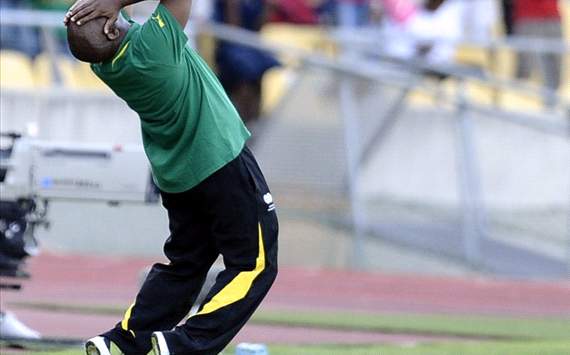
Guest post by Mohlomi Maubane
The Germans regularly find a way to excel in tournaments and are among the favourites to win the Euros in Poland/Ukraine. The South African football fraternity would do well to take a page out of the playbook that produced the current incarnation of Die Manschschaft when appointing a new Bafana Bafana coach. SAFA fired Pitso Mosimane this week after Bafana Bafana could only muster a 1-1 draw against Ethiopia in a 2014 World Cup qualifier in Rustenburg.
Eight years ago, the German national team was in dire straits after failing to win a single match in the group stages of the 2004 Euros. A rebirth seemed inevitable, and the newly appointed technical team of Jürgen Klinsmann and Joachim Löw pursued it with typical German precision.
Their first step was to give Die Manschschaft a new identity. The duo settled on a style based on playing the ball on the ground and transitioning swiftly from defence to attack. This was the outcome of an extensive consultation process. Workshops were held with German coaches and players to inquire how they wanted to play and how they wanted to be seen to be playing by their fans (and international ones too). Members of the German public also enjoyed the opportunity to provide input on how they wanted the national side to play.
From this inclusive process, Klinsmann and Löw drafted a curriculum for German football that was presented to the Bundesliga and the German FA. The latter then pressured teams in the former to build academy programmes that adhered to the overall strategy. Bundesliga teams were also encouraged to adopt a fitness programme that enabled the philosophy to be implemented. The newly appointed Under-21 coach also had to abide by the new policy.

The football skills of Richard W. Msimang, a prominent early member of the now 100-year-old African National Congress in South Africa, were reportedly as sharp as his legal mind and political acumen. Last year on this blog I posted a portion of an article published in a 1913 issue of the ANC’s newspaper Abantu Batho (given to me by Peter Limb) that provided a glimpse into Msimang’s sporting past as a student in South Africa and Britain.
Born in Edendale, a freehold black area on the outskirts of Pietermaritzburg, KwaZulu-Natal, a community with a well-deserved reputation for defiance of colonial authority, Richard and his brothers Selby and Herbert grew up refusing to be black servants of white masters. Sport, formal education, and political activism channeled the enlightened self-interest of the Msimangs much like they informed the 20th-century South African struggle for political and cultural empowerment. Thanks to the kindness and generosity of Geoff Bisson (Queen’s College, Taunton), Brian Willan (Rhodes University), and once again Peter Limb, I can now share additional evidence of Richard Msimang’s prowess on the football and rugby pitch.
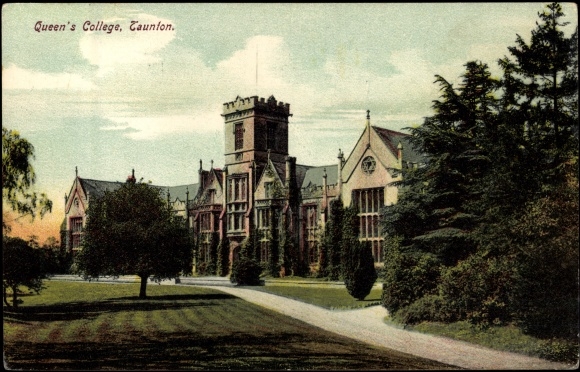 The revealing passage below focuses on Msimang’s time at Queen’s College, Taunton (see postcard), a boarding school in the West of England. In his book History of Queen’s College, Taunton (Taunton, England: Old Queenians’ Association, 1957; p. 157), H. J. Channon writes:
The revealing passage below focuses on Msimang’s time at Queen’s College, Taunton (see postcard), a boarding school in the West of England. In his book History of Queen’s College, Taunton (Taunton, England: Old Queenians’ Association, 1957; p. 157), H. J. Channon writes:
On a cold, wet afternoon in November, 1904, a few of us were practising shooting at goal on the Lower. We noticed a dark figure, in a bowler hat and a heavy black overcoat, standing on the terrace watching us. It was the first day at Queen’s of a Zulu, R. W. ‘Msimang. He passed through the gap on to the field. The soccer ball was thrown to him, and he could not resist the temptation of racing towards it. Unfortunately for him the ball stopped just in front of a deep pool. Through the water ‘Oomsi dashed, slipped and sat down, with his bowler floating away from him. We took him up to the Linen Room for a complete change of clothes. His charming smile we saw for the first time it never seemed to desert him. In his own country he had played a lot of soccer, but on the hard grounds he had never worn boots. It was not long before he was in the first XI, and at first when the ground was hard he dispensed, with football boots. I can see him now dashing down the left wing to the corner flag and middling the ball with perfect accuracy. After several years he was articled to a Taunton solicitor, but continued to live at the school. He took up rugby, and became the most popular player Taunton has ever had. The crowd loved to see him emerge with a smile from the bottom of a heap of forwards. He was a brilliant scrum-half [fly half according to Willan], tough and with a swerve that made it difficult to bring him down. So popular was he, that sometimes he had to leave the ground by a back exit to avoid the crowd. After he had passed his final law examination he returned to South Africa, where he became a State Attorney under the Transvaal Government.
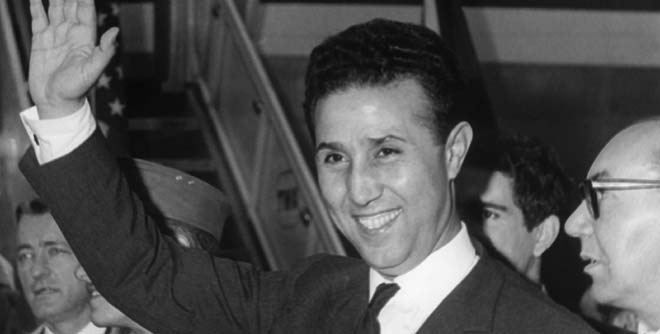
Ahmed Ben Bella, the first president of Algeria, died in Algiers at the age of 93. The son a farmer and petty trader, Ben Bella lived a life of struggle, beginning at the age of 16. As James Gregory’s poignant obituary in today’s New York Times explained, “Ben Bella chafed at colonialism from an early age — he recalled a run-in with a racist secondary school teacher — and complained of France’s cultural influence. ‘We think in Arabic, but we talk in French,’ he said.” Ben Bella’s political conscience was sharpened on high school football pitches under colonial rule. “When I maneuvered at speed against the enemy,” Bella remembered, “nobody asked me whether I was European or Algerian — I either scored or I didn’t, and that was that. I was responsible only to myself for success and failure alike.”
Conscripted into the French military in 1937, Ben Bella “took to soldiering as readily as he had to soccer back home. He was promoted to sergeant and won celebrity as a soccer star in Marseille,” according to the Times. He earned the Croix de Guerre for bringing down German bombers with his anti-aircraft gun during the Nazi assault in 1940. After the fall of Marseilles, Ben Bella was offered a professional football contract but turned it down and returned home instead. He eventually joined the Free French forces under De Gaulle and was decorated again for his role in the Italian campaign of 1944. After the war, he became a leader in the Algerian independence movement.
Ben Bella, like other African nationalists, believed that football — originally a European colonial game — could be appropriated and made to express African people’s desire for equality and freedom. While in exile during the second phase of Algeria’s war of independence (1958-62), he lent his imprimatur to the FLN XI — a remarkable team of France-based professionals formed in 1958 that came to symbolize Algeria’s quest for freedom and its crystallizing national identity. (For more details about the history of this team, see my book African Soccerscapes and Ian Hawkey’s Feet of the Chameleon. French readers can also consult R. Saadallah and D. Benfars’s La Glorieuse Équipe du FLN and Michel Nait-Challal’s Dribbleurs de l’indépendance.)
Ben Bella later became Algeria’s first Prime Minister and then its first president (1963-65), until a military coup got rid of him and kept him under house arrest for 14 years. Exiled in 1980, he still managed to celebrate Algeria’s 2-1 victory over West Germany in the 1982 World Cup: the first World Cup win by an African team against a European side (highlights here). Ben Bella returned to Algeria in 1990 and remained politically engaged, as an opponent of the U.S. war in Iraq, and as a critic of global capitalism and radical Islamism. Ultimately, his football style and leadership style informed each other: “Ben Bella always wanted his teammates to pass the ball so that he could score,” a former schoolmate recalled. “He was the same in politics.”
—
Suggested Reading
Mahfoud Amara, “Football Sub-Culture and Youth Politics in Algeria,” Mediterranean Politics, 17, 1 (2012): 41-58.
